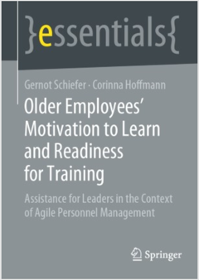Publications
As part of my university activities, I regularly publish books in the Springer series "essentials" in collaboration with particularly outstanding Master's graduates.
Schiefer, G. & Gattner, R. (2019). Neuroleadership - the basic assumptions in critical analysis - Neuroscientific advancements of leadership theories in comparison.

- In this essential, three central neuroleadership concepts are presented in a condensed form and critically examined. Through a systematic comparison with established leadership theories, the authors show that neuroscientific approaches are consistently based on insights from existing, leadership-theoretical considerations. Neuroleadership sees the key to successful leadership in the application of neuroscientific findings. This approach is celebrated by its proponents as a revolution in leadership theories, while critics see it as a reformulation of well-known theories. The extent to which a neuroscientific perspective in the form of "neuro-realism" is nevertheless helpful in formulating existing leadership theories more convincingly in the future is discussed in conclusion.
Schiefer, G. & Hoffmann, C. (2019). Learning motivation and readiness for further training of older employees - Help for managers in the context of agile human resource management 
- The learning motivation of older employees is a complex psychological construct that has hardly been addressed so far. In times of demographic change, it is of central importance to motivate older employees to engage in continuous learning in order to keep them employable. With increasing age, changes in learning and performance as well as a decreasing motivation for further vocational training become apparent. Gernot Schiefer and Corinna Hoffmann show the connections between motivation, performance and learning behavior and analyze motivation factors and learning obstacles of older employees. In a practical way, the authors present possibilities for companies to actively contribute to the promotion of learning motivation of their older employees.
Schiefer, G. & Nitsche, H. (2019). The role of the leader in agile organization - How leaders and companies should rethink now 
- This essential focuses on opportunities and limitations in implementing agile human resource management and presents approaches to support managers in their role. The authors outline the challenges of a manager who exemplifies an agile way of thinking and working to his or her employees. They work out how top management and human resources management can contribute to managers fulfilling this role. Last but not least, the dependency of the leadership culture on the corporate culture from the perspective of the executives is discussed.
Schiefer, G. & Gehrlein, L. (2021). Nostalgia as a mood enhancer - Theoretical introduction to nostalgic remembering and its emotional effects 
- This essential gives a detailed overview of Nostalgia. It goes back to the roots of the construct, shows how nostalgia is triggered, and presents the content of nostalgic memories. Furthermore, the authors show how nostalgia can be used to create positive effects. In addition to the positive effects, the limitations of nostalgia are presented and it is shown when and for which persons nostalgic time travel is not beneficial. In addition, the authors explore the question of what effects nostalgia has on the specific group of depressed people.
Schiefer, G. & Hoffmann, C. (2021). Older Employees’ Motivation to Learn and Readiness for Training - Assistance for Leaders in the Context of Agile Personnel Management 
- This is the English edition of the book published in 2019: Learning motivation and readiness for further training of older employees.
go to top
